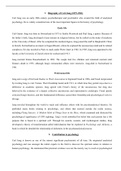1. Biography of Carl Jung (1875-1961)
Carl Jung was an early 20th century psychotherapist and psychiatrist who created the field of analytical
psychology. He is widely considered one of the most important figures in the history of psychology.
Early life
Carl Gustav Jung was born in Switzerland in 1875 to Emilie Preiswerk and Paul Jung, a pastor. Because of
his father’s faith, Jung developed a keen interest in religious history, but he settled on the study of medicine
at the University of Basel. After he completed his medical degree, Jung joined the staff at Burghoelzli Clinic
in Zurich, Switzerland as an intern to Eugen Bleuler, where he explored the unconscious mind and its related
complexes. He also traveled to Paris to study under Pierre Janet in 1902. In 1905, Jung was appointed to the
faculty at the University of Zurich where he worked until 1913.
Jung married Emma Rauschenbach in 1903. The couple had five children and remained married until
Emma's death in 1955, although Jung's extramarital affairs were extensive. Jung died in Switzerland in
1961.
Professional life
Jung sent a copy of his book Studies in Word Association to Sigmund Freud in 1906, and Freud reciprocated
by inviting Jung to visit Vienna. Their friendship lasted until 1913, at which time they parted ways due to a
difference in academic opinion. Jung agreed with Freud’s theory of the unconscious, but Jung also
believed in the existence of a deeper collective unconscious and representative archetypes. Freud openly
criticized Jung's theories, and this fundamental difference caused their friendship and psychological views to
diverge.
Jung traveled throughout the world to teach and influence others with his psychoanalytical theories. He
published many books relating to psychology, and others that seemed outside the realm science,
including Flying Saucers: A Modern Myth of Things Seen in the Skies, which examined and dissected the
psychological significance of UFO sightings. Jung’s work embodied his belief that each person has a life
purpose that is based in a spiritual self. Through his eastern, western, and mythological studies, Jung
developed a theory of transformation called individuation that he explored in Psychology and Alchemy, a
book in which he detailed the relationship of alchemies in the psychoanalytical process.
2. Contribution to psychology
Carl Jung is known as one of the utmost significant psychiatrists of all time. He originated analytical
psychology and was amongst the initial experts in his field to discover the spiritual nature in relation to
human psychology. He maintained that practical evidence was not the merely way to reach at psychological
, or scientific truths and that the soul plays an important role in the psyche. Important contributions of Jung
are as follows:
The collective unconscious: A collective cultural source of archetypes and human experiences.
Dream analysis and the understanding of symbols from the collective unconscious that appear in
dreams.
Extroversion and introversion: Jung was the main one to ascertain these two personality qualities,
and parts of his work remain to be recognised in the theory of personality and in personality testing.
Psychological complexes: A collection of behaviors, memories, and emotions grouped around a
common theme. For example, a child who was deprived of food might grow into an adult smoker,
nail biter, and compulsive eater, focusing on the theme of oral satiation.
An emphasis on spirituality: Jung argued that spirituality and a sense of the connectedness of life
could play a profound role in emotional health.
Individuation: The integration and balancing of dual aspects of personality to achieve psychic
wholeness, such as thinking and feeling, introversion and extroversion, or the personal unconscious
and the collective unconscious. Jung argued that people who have individuated are happier, more
ethical, and more responsible.
The persona and the shadow: The persona is the public version of the self that serves as a mask for
the ego, and the shadow is a set of infantile, suppressed behaviors and attitudes.
Synchronicity: A phenomenon that occurs when two seemingly unrelated events occur close to one
another, and the person experiencing the events interprets this correlation as meaningful.
3. Levels of the psyche
Conscious
Conscious images are those that are sensed by the ego, whereas unconscious elements have no
relationship with the ego.
Ego as the center of consciousness, but not the core of personality.
Self, is the center of personality that is largely unconscious
In a psychologically healthy person, the ego takes a secondary position to the unconscious self (Jung,
1951/1959a).
Healthy individuals are in contact with their conscious world, but they also allow themselves to
experience their unconscious self and thus to achieve individuation




